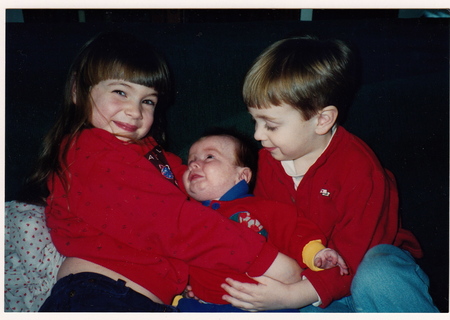
In early 1996, I sat down at my computer looking for help.
My third child, 2 months old, had just been diagnosed with a severe brain malformation called lissencephaly. He won't be normal, the doctors said grimly. His life will be shorter, we were told. He will have seizures and other problems, they said, but it's hard for us to say what or how bad those problems will be. We were sent home from the hospital with prescriptions and appointments and not much else.
I went to an AOL message board for parents of children with disabilities. My son was just diagnosed with a severe brain problem, I wrote. I need help.
A reply came, miraculously, from the mother of a child with lissencephaly. At first, she wrote, a good day is one when you don't cry all day.
She connected me to the Lissencephaly Network, a resource and support organization (that our doctors didn't know existed -- and whose site is under construction now). Through them, I learned all about lissencephaly and what we might expect moving forward. I learned about what we might need and how to get it. I made friends and became part of a community that not only welcomed me, but welcomed and celebrated my son. He is wonderful, they said to me. He is an angel like our angels.
So I wasn't surprised when I read the article in Pediatrics written by both a doctor and the mother of a child with Trisomy 13 that said that parents who are involved with social networks are more informed and may have different hopes and expectations for their children -- often more positive -- than their doctors. Our experience during the year Aidan was alive was hard, but very positive, much more positive than we expected after those first conversations with the doctors.
Recently, Pew Internet came out with a report called "Family Caregivers Online." It put actual data and numbers to what we caregivers know well: We turn to the Internet for help. Of the 79 percent of caregivers who have Internet access, 88 percent look for health information online. They are more likely to read someone else's personal health story online, more likely to follow the health experiences of others on social media and more likely to look for people with similar health concerns. They are also more likely to read online rankings or reviews of treatments, doctors and hospitals.
The lead author, Associate Director of Pew Internet Susannah Fox, wrote a wonderful blog called "Health Care Hackers." That's how she describes those of us who use the Internet to make the health care system work for us and our families. She talks about how what we are creating is peer-to-peer health care.
Doctors are far from obsolete, of course. The Pew report says that 90 percent of adults in the U.S. say that health professionals are more helpful than fellow patients, friends and family when it comes to getting an accurate diagnosis. People turn to doctors for practical advice, too -- but they are just as likely to turn to those fellow patients, friends and family for advice as to doctors.
Doctors and families are both absolutely dedicated to a patient's care. But families love their children desperately and need things to be good more than doctors do -- this doesn't make doctors bad, it's just what comes with being family. And families, unlike doctors, are living every moment of every day with the patient. Enter the Internet.
The Internet, however, is not a perfect place for information. I was lucky that the Lissencephaly Network was a reliable resource. And as a doctor, I could weed out good information from bad -- which is important, because there's a lot of bad information out there.
What we need, really, is a doctor-family partnership on the Internet. We need more health professionals to not only provide good information themselves, but to help guide people toward good sites and away from less helpful ones. Increasingly, as Pew Internet has shown in other reports, the Internet is where people go for their health information; health professionals need to join them there.
It means thinking outside the box; it means redefining the practice of medicine as existing beyond the exam room space. There are challenges: patient privacy is crucial, and it's never a good idea to make a diagnosis online. But if we think of the online space as an extension of in-person health care, not a replacement, we can begin to see the incredible potential and possibilities that exist. One of the biggest and best possibilities is that doctors could learn more from their patients.
As Fox says in her blog, "We all have something to learn. We all have something to teach."
